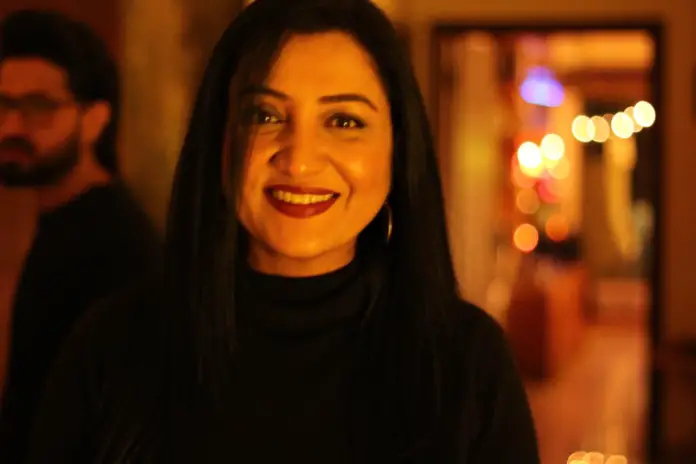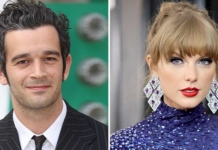What to call her? Mishi? Taabinda? Shahana or Badar Munir? Nadia Afgan has this skill of putting her fans in a quizzical situation occasionally, as she dons a new avatar every time and enriches it with a performance that is hardly ever over-shadowed by her previous characters, no matter how popular they are. Afgan quickly snaps out, inclining the viewers to remember her for a long time for a name other than her own, until she appears in another off-beat project to spellbind once again. Daily Minute Mirror got in touch with the Shashlik and Suno Chanda fame actress to have a detailed conversation about the past, the present, and the future of one of Pakistan’s much-adored performers.
- You have seen two phases of popularity; one when you did the sitcom Shashlik and became popular as Mishi, and one when you performed in Suno Chanda and rose to fame as Shahana. Which of the two phases have you enjoyed more?
Shashlik belongs to the earliest days of my career. I don’t think I had worked much before Shashlik, except for in Jawad Ahmed’s O Kaindi Aye Sayyian Mein Teriyaan. In fact, a few days back, I came across a clip from Shashlik on an Instagram page called ‘Puraanay Din’ and told myself how bad an actress I was. Both Sarmad and I laugh at ourselves whenever we re-watch Shashlik. Still, people loved Mishi and Cheeku, probably because back at that point in time, there was a whole new wave of young writers, directors, actors and singers who were experimenting with stuff, the genre of sitcom being one of them. People like me, Sarmad Khoosat, Adeel Hashmi, Mira Hashmi, Ali Hamza, Ali Noor, Vasay Chaudhry and Ahmed Ali Butt were so young and passionate and not only worked hard back then, but have done a lot of work over the years to bring change and newness. Coming back to Mishi, I at times would feel that Mishi is what I really am in my real life, a little bit of a ‘churail’ maybe (laughs). Shashlik, I believe, made us. It belongs to the times when we were young, energetic and had dreams and were working hard to achieve them. Suno Chanda too, was comedy, but I was lucky enough to have a very good team working with me. We had a lot of replacements initially, though. Even I wasn’t the first choice for Shahana’s character. We had no idea that it would grow so popular. Most of the serials being made at that point in time were serious, and MD Productions’ decision to produce a sitcom clicked very well with the people, giving Suno Chanda immense popularity. If I were to compare the two phases, both of them came with their respective charms. I have equally enjoyed the two, and both Mishi and Shahana are very, very close to my heart.
- Is it true that you are more inclined towards comedy, considering that you have countless sitcoms to your name such as Suno Chanda, Hoo Bahoo, Larka Karachi Ka, Naak Mein Dum, Black and White and many others?
I started my career with comic projects, actually, and did lots and lots of them, such as Jutt and Bond, Family Front, Aik Do Teen along-with the ones you have mentioned. People like Samina Ahmed and Sarmad Khoosat were producing them while writers like Dr. Younas Butt were prolifically penning them. I learnt comedy from the greats involved in these projects such as Saba Hameed, Salman Shahid, Ashraf Khan and Samina Ahmed herself. Saleem Sheikh and I had a wonderful on-screen chemistry and we would frequently appear together in sitcoms. It might have to do with the rich performers I started my career with, who were doing even comedy with so much grace and perfect timing and were spreading happiness. Watching the likes of Saba Hameed perform in Family Front made me fall in love with comedy, I believe. Samina Ahmed, whom I consider my mentor, gave me a lot of work in the area being discussed.
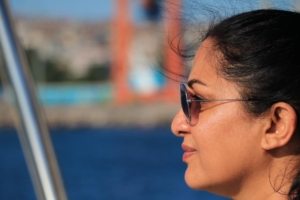
- When you are given characters from novels or stories to perform, such as Tabinda from Shehr e Zaat or Saugandi from Manto, do you read the original text to have an idea of how the character was originally conceived, or do you focus on the screenplay only?
Not always! At times, it may happen that I might have read the original text before. Manto’s stories are an example, which I had already read. Talking about Shehr e Zaat, I hadn’t read the novel and didn’t go for it either, because I did Taabinda’s role on a short notice, not having much time to go about the nuances. But yes, I always thoroughly read the script. People often wonder why I read my co-stars’ scenes as well. A lot of projects aren’t offered to me because I ask for the entire script, not just my part. I work on the condition that I’ll read the whole script before signing it. I do read novels, but when it comes to the ones I haven’t read, I consult my mother who has been an avid reader. I never compromise on my scripts, and that is the reason why many young actors find it strange when they see my scripts fraught with notes.
- Have you ever rejected any script? If so, then why? What is that one thing you look for in a script and what is that one thing you avoid?
I reject a script every other day! I am not saying this out of pride. There are times when I realize that I am not working much despite my need to survive like all those actors who do around fifty projects in a year. As an actor, I always look for a role that gives me a margin to prove my versatility and appear different every time. I am tired of doing similar kinds of roles as a result of our clichéd topics. I also reject scripts if I don’t admire the dialogues, or even the entire story. Initially, I compromised a lot but I can’t do it anymore. I even try my best to make changes where and when required, but if things still don’t turn out right, I walk out of the project. Not that I am always feel happy doing that. I do think it’s not right to reject work coming your way while there are people who are yearning for work. But then, I convince myself that I am rejecting stuff because it just doesn’t appeal to me, and doesn’t synchronize with my motives as an actor, which might result in an injustice to the character from my side. Every actor has this desire of appearing in a different avatar every time. I look for good stories, in-depth characters and dialogues that click me there and then.
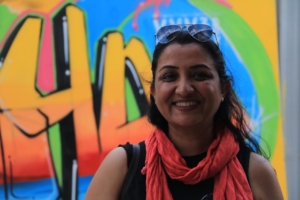
- You showed us your talent as a director too with the serial Parlour Wali Larki. Why didn’t you direct anything after that? If you were to make more dramas as a director, what would your perspective be as a storyteller?
Parlour Wali Larki is not the only serial I have directed. There was a point in time when I directed a lot of sitcoms and serials for HUM TV and ARY, Dosti Aisa Naata and Yes, Sir! being two of them. I also directed a serial under the banner of A & B Productions which revolved around three progressive women with goals other than finding a suitable man. That serial, however, was unlucky to be released at a time when the production house was just about to collapse, and it got lost somewhere. Parlour Wali Larki still gets a wonderful response and people continue to ask me why we didn’t make more of its episodes. I love direction. Even recently, I was asked by MD Productions to direct a serial written by Saima Akram Chaudhry, but I found it a bit too similar to Suno Chanda and I refused. I have been offered another one which I might direct because I like the story. As far as my perspective is concerned, I avoid showing artificial beauty. What matters more to me is a human being the way he or she is, or the way people are, generally; raw, emotional and beautiful for the way they have been created in terms of their personalities. I connect more with reality, and reality depicted in a reasonable manner.
- Name one writer and one director, working with whom has been a pleasure for you. Is there any such writer or director with whom you wish to work but haven’t been given the opportunity yet?
I love working with Sarmad Khoosat and Kashif Nisar. Kashif Nisar is one such director who is very careful about the execution of every single character of his. He is one of those few people who read the entire script and know where to lead the characters to. I love how he applies the cause-and-effect theory to characters and brings out logical reasons for the way they behave and depict emotions. Coming to writers, I really admire the scripts of Zafar Mairaj, Amna Mufti, Bee Gul, Saji Gul and Faseeh Bari Khan.
- Seniors often complain about young actors being rude and non-serious. How has your experience been of working with so many young actors like Iqra Aziz, Farhan Saeed, Nabeel Zuberi etc? Have you ever faced punctuality issues?
Initially, I did use to get upset with these things. But gradually, I made myself understand that every age comes with its lifestyle and behaviours. I have stopped bothering myself about how youngsters work and how they behave on social media. I focus on my own work and reach the set on time. You can politely tell someone to be conscientious, but can never understand how they are going through their journey and what their ways to tackle it are. As far as the ones you have mentioned are concerned, all of them are extremely hard-working and down to earth. I have also worked with Maya, Sahifa, Sajal and Saboor and none of them has disappointed me a bit. There are people who are not much punctual, but it’s not my duty to lecture them when I am working as their co-star. It’s the director’s responsibility to guide them.
- Being a director yourself, do you chisel your characters the way you like or do you leave it to the director you are working with? Have you ever had a row with any director regarding a role of yours?
I never work singlehandedly. I thoroughly discuss my character with my director, and even with my co-actors during the scenes to have an unbiased opinion about it. With some young directors, I prefer doing things my own way but the director, after-all, is the captain of the ship and deserves respect for being the story-teller during a project. As far as rows are concerned, yes, I have had many of them. I even had a fight with Ahson Talish during the shoot of Suno Chanda, but they are always resolved at the end of the day. As an actor, you have to bow before the director.
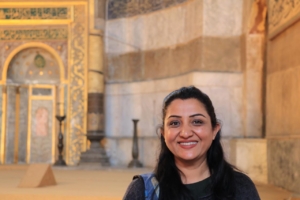
- For a short period of time, you did a couple of dark plays by Faseeh Bari Khan. Do you miss those times when stories were being experimented with? Now that writers are not given similar freedom, which writer do you look up to for comparatively better content?
Yes, I did a lot of work with Faseeh Bari, back when he had formulated a duo with Mazhar Moin and the two of them were working together. From the current lot, I love working with Amna Mufti. Her script, Dil Mohallay Ki Haveli was extremely beautiful but didn’t get the attention it deserved.
- What does Nadia Afgan do when she is not acting?
I sit at home, relax, watch Netflix, read books, cycle, doodle, paint and play with my dogs. I meet a friend or two if I feel like it. Otherwise, I spend time with my husband who is also a very good friend of mine. I also visit my parents who reside in Islamabad. Usually, however, I love spending time with myself; at times on my terrace watching the sky instead of socializing.
- Social media has played havoc with many celebrities’ lives. How do you manage your social media handles?
I made my Instagram account during Suno Chanda, and it luckily gained a huge fandom following the success of the project. I handle my social media accounts myself and do not let it get on my nerves. The only thing you need to know is yourself. If you know who you are as a person, then trolling won’t matter to you much. To be honest, I learnt this after my role in Shehr e Zaat. Social media was new back then, and I was shocked to see people actually ridiculing my physique and looks under the cover of their comments on Taabinda. “Yeh Taabinda kitni moti, kaali aur bhaddi hai” (How fat, dark and ugly is Taabinda), they would say. It was then that I sat down and told myself that I don’t care as long as I am secure about the way I am. I even called Sarmad Khoosat and told him that any other actress would have committed suicide, had she been in my place doing the role of Taabinda.
- What are you currently working on?
I am currently working on a Zafar Mairaj script being directed by Kashif Nisar, called Kaabuli Pulao. It’s almost complete and I am dying for it go on air. Another one is Dushman directed by Abdullah Badini and written by Ali Moeen, in which I am playing a Seraiki woman. It’s quite a powerful role of a woman who is the head of a clan. I will also be making an appearance in a web-series along-with Samiya Mumtaz. Another project I am really excited about is Honey Moon which Fahim Burney will be directing, and in which I’ll be doing comedy after a long time. It will also star greats like Saba Hameed and Usman Peerzada.
*All pictures provided by Nadia Afgan*




